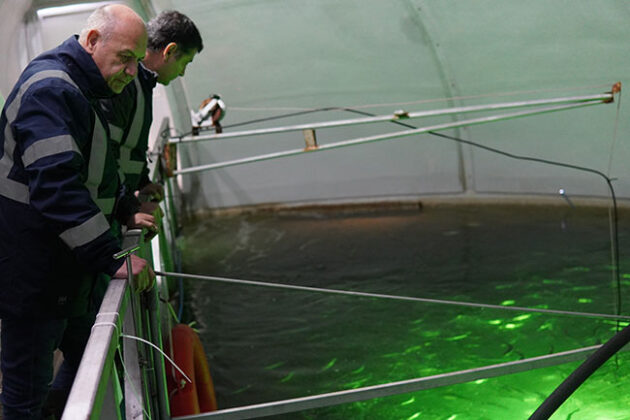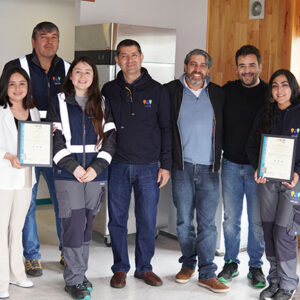
Features
post-smolt
Profile
Pioneering animal welfare in Chile
Smolt producer, Lago Sofia, is the first in the country to achieve the highest standards of farmed fish welfare.
April 12, 2024 By Christian Pérez-Mallea
 General view of the Chinquihue smolt farm.
Photos: Christian Pérez-Mallea
General view of the Chinquihue smolt farm.
Photos: Christian Pérez-Mallea After years of refining its land-based farm design, promoting animal welfare awareness among its workforce, and honing production processes, Lago Sofia achieved certification on Nov. 21, 2023, in “Animal Welfare in Farming Fish Production Systems.” This makes the company the first animal welfare-certified fish farm in Chile.
The Chilean company reached the pinnacle of compliance in the “WELF CERT” standard is conferred by certification company, FSTeam and endorsed by the Chilean Animal Welfare Association. The certification is based on local regulations and recommendations of the World Organization for Animal Health (OIE).
The facility
The smolt farm – belonging to Lago Sofía – is a 7,400 cubic metres facility located 12 kilometres south of downtown Puerto Montt, in the Chinquihue area. Those 7,400 cubic metres correspond to 22 tanks of 300 cubic metres and eight tanks of 100 cubic metres, totaling a maximum production capacity of 2,205 tons per year. The facility operates under individual recirculating aquaculture systems (RAS), where each biofilter is tied to just one tank and has been designed to operate with over 350 kilograms of feed per day.
Currently, the company receives Atlantic salmon fry (30+ grams) and delivers smolts, depending on each client, in weights that range between 130 and 250 grams.
The water intake comes from two wells and a watershed located within the premises. About 40 people work in this freshwater site, which originally opened in the 1980s, making it one of the oldest smolt farms in the region.

Lago Sofia support manager, Patricio Mancilla, and technical manager, Pablo Carrillo, looking inside one of the tanks
The standard
The CEO of FSTeam, Roberto Becerra, explained that the audit process within the WELF CERT certification consists of nine areas for review: administration and managerial commitment; review of quality control policies; the use of proper signage; contractual stipulations that warn workers against animal mistreatment; feed and water checks; and specific fish management and procedures.
Direct assessments of animal welfare must be carried out, where fish samples are taken, anatomical conformations recorded, and checks taken for parasites, diseases, wounds, deformities and so on.
Next, infrastructure is checked including tanks, animal movement lines, loading and unloading. Everything related to the recording of parameters are also reviewed.
Implementation
According to Miguel Portus, CEO of Lago Sofia, the certification process commenced six years ago during the redesign of the smolt farm, integrating animal welfare best practices. Support from Stirling University researcher and animal welfare specialist, Sunil Kadri, PhD, facilitated awareness among employees, emphasizing the significance of animal welfare.
“In the past two years, we worked on procedures, identifying areas for improvement, optimizing processes, and adjusting specific protocols for feeding and vaccination,” Portus explained. He stressed that responsible and respectful farming is at the core, encompassing factors like cortisone levels, density, feeding practices, management, and the use of additives or farming products.
Portus also highlighted the advantage of Chinquihue being an individual RAS farm, providing a stable environment crucial for smolt wellbeing.
“Individual RAS farms control variables effectively, with a determined limit on the number of fish in each unit, facilitating targeted problem-solving without affecting the entire stock,” he said.
“Another significant advantage is that we are located two to three minutes away from the main shipping ports in the region, so, one of the reconfigurations we made five years ago was that 100 per cent of the tanks are loaded by gravity. Therefore, when the truck arrives, we do not use any machine to take the fish out from the truck, which is something that was thought to raise the well-being on arrival, which is already a critical event.”
Costs and advantages
While adherence to the standard is voluntary and not a regulatory requirement, implementation costs play a pivotal role in the decision-making process. Portus acknowledged that costs are substantial but emphasized that it is more cost-effective when incorporating these standards into a new land-based farm rather than adapting existing facilities. He underlined the importance of corporate culture and a commitment from the top for successful implementation.
Becerra, veterinarian and CEO of FSTeam, clarified that the WELF CERT certification aims to democratize animal welfare rather than increase product prices.
“FSTeam works to assist producers in enhancing animal welfare, potentially improving productivity and market access,” he said.
The future of welfare in Chile
As Lago Sofia operates in the initial stage of farmed salmon production, attention turns to the broader application of this approach in the entire salmon farming industry and at a regulatory level. Portus is optimistic that other salmon producers will follow suit, noting existing projects like Pincoy working towards incorporating animal welfare standards.
Becerra anticipates increasing global regulatory requirements for animal welfare, citing Chilean Law 20.380, which addresses animal welfare in general. Although specific legislation for the aquaculture sector is lacking, he expects evolving concerns from consumers and legislators to lead to additional regulations over time.
In conclusion, Becerra emphasized that animal welfare is not a trend but a moral, productive, and legal obligation. The challenge is to democratize animal welfare and make certified products accessible to everyone without additional costs.
Print this page

